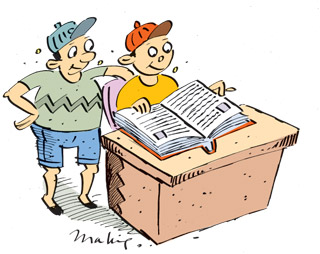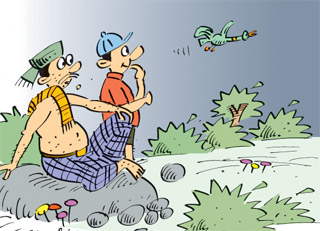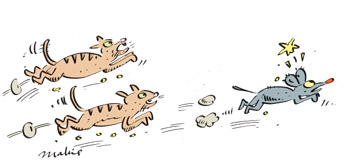|

by R. S. Karunaratne
How to use 'very'
in sentences
As an adverb very can be used to emphasize another adverb or
adjective. As an adjective it means 'exact' or 'extreme'.
1. We use 'very' to emphasize the quality of something.
|

This is the very book I was looking for. |
Five star hotels are very expensive.
The station master announced that the train was getting very late.
I go bird watching with my father d very often.
Your results are very good.
Miss Mexico won the Miss Universe title because she is very
beautiful.
2. We use 'very' to emphasize the quantity of something.
I like psychology very much.
There are very few Sinhala films.
"This box is very heavy," said the porter.
The principal gets a very big salary.
This book has a very few illustrations.
3. We use 'very' to add emphasis to a superlative.
I'll do my very best to finish the project on time.
She goes to ABC shop because it sells the very latest fashionable
shoes.
4. We use 'very' to emphasize the exactness or extremeness of
something.
This is the very book I was looking for.
Did you climb to the very top of Sigiriya?
5. Collocations
Certain adjectives are commonly used with 'very'.
Subashini is a very good dancer, indeed.
It's very nice of you to have come here.
This is a very difficult book to read.
Raj is a very important official.
Sujatha is very different from her sister.
It's very hard to find honest people.
It's very likely to rain in the evening.
6. Set phrases
|

I go bird watching with my father d very often. |
A: How are you keeping?
B: Very well, thanks. And you?
(In response to a greeting)
A: Here's your balance.
B: Thank you very much
(A polite expression)
A: How is his English?
B: Not very good.
(Emphasizing the opposite quality in a polite way)
Arthur can't very well leave her daughter here. (It is not right or
possible to do so.)
A: Does my drilling annoy you?
B: Very much so.
(You agree emphatically)
At last I am going to have my very own house.
(You emphasize that the house does not belong to anyone else).
Both of us studied at the very same school. (Exactly the same).
Current English usage
English being a living
language is subject to change from time to time. Here's some help for
you to keep abreast with the current English usage.
1. Charted and chartered
These are confusable words. 'To chart' is to 'make a chart or map.'
The surveyors are charting the area to put up a housing complex.
Charter means to say officially that a town or organisation
officially exists and has special rights.
Peiris is a chartered accountant.
2. Chauvinism is a fashionable word that means 'excessive enthusiasm
or devotion to a cause'.
XYZ club is a bastion of male chauvinism.
3. Check and Cheque
As a verb check means 'to make sure that something is in order.'
Did you check whether he has locked the gate?
Cheque is a printed piece of paper used instead of cash.
He wrote a cheque for Rs. 50,000.
In American English cheque is written as check.
4. Chemist and pharmacist
Both words have the same meaning: someone who prepares drugs ordered
by a doctor. However, chemist has the additional meaning: a scientist
who works in the field of chemistry'.
Lawrence is an industrial chemist.
5. Childlike and childish
Childlike is a term of approval.
My grandmother has a childlike enthusiasm for telefilms.
Childish has a derogatory meaning.
Stop messing around, it's so childish.
6. Chord and cord
Chord is a musical term.
You are playing the wrong chord .
Cord is a piece of string.
Bring me a piece of nylon cord to use as a washing line.
7. Christian name and First name
Christian name is someone's first name as opposed to surname. In a
multi-cultural society there are non-Christians. Therefore, we ask for
the first name.
8. City and town
A city is larger and more important than a town.
New York is a city.
Ambepussa is a town.
9. Clean and cleanse
Cleanse indicates a more thorough cleaning than clean. In a religious
sence cleanse means 'to purify the soul.'
10. Cirrhosis (a disease of the liver) is spelt with 'rrh'
combination.
Starters :
Simple and Continuous Present Tense
We use simple present tense in the following ways.
1. We use it to show habits and regular actions or to refer to
current situations.
Sam wakes up at 5.30 a.m. everyday.
|

The cats are chasing a mouse. |
Father works in a private firm.
We eat rice and curry.
Sita carries an umbrella wherever she goes.
Some people smoke although it is a bad habit.
2. We use it to state eternal truths.
The sun rises in the east.
We breathe through our noses.
Birds fly in the sky.
Green plants use energy from sunlight to convert carbon dioxide.
Many big fish live in the sea.
3. Some words are always used with verbs in the simple present tense.
She always wears a white sari.
We eat everyday to get energy.
The Sunday Observer is published every week.
Madhusha often quarrels with her classmates.
Henry sometimes loses his temper.
They usually work from 9 a.m. to 5 p.m.
4. We use the present continuous tense to show that an action is
going on at the time of speaking or writing.
Formula: Present tense form of the verb 'to be' + base form of verb +
'ing.'
Nimal is studying.
Hema is playing table tennis now.
Hema is playing table tennis tomorrow.
The tourist is waiting for a cab.
Mother is baking a cake.
Our neighbours are visiting Sigiriya.
The cats are chasing a mouse.
5. Certain verbs do not usually take the continuous tense.
I do not believe him.
This book does not belong to me.
The bottle contains milk.
Do you hear what I say?
She does not know his address.
Students like to play.
She owns this house.
Can you see a ship in the sea?
I smell something pleasant.
Activity
Underline the correct verb in the following sentences.
1. Udula is working/works on her camputer everyday.
2. Mother and father are intending/intend to repair the house.
3. Abraham is driving/drives a taxi now.
4. This book is containing/contains many pictures.
5. My friends are leaving/leave for Paris tomorrow.
*********
[Key]
1. works
2. intend
3. is driving
4. contains
5. are leaving
********* |

